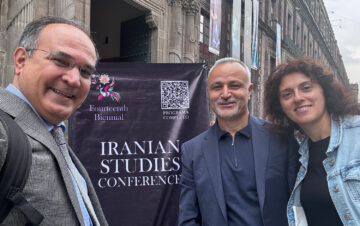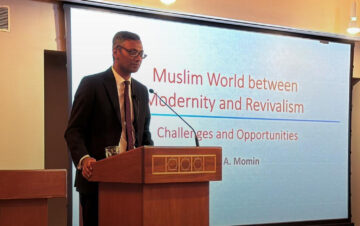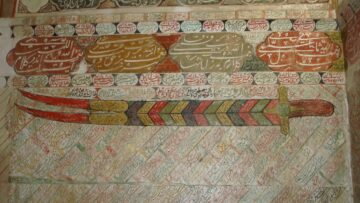The fifth lecture in the Shi‘i Studies Lecture Series was entitled The Zaydi Reception of Abu l-Husayn al-Basri and Ibn al-Malahimi: Husam al-Din ‘Abd Allah b. Zayd al-‘Ansi (d. 1268 CE) and his Kitab al-Mahajja al-bayda. It was delivered by Professor Sabine Schmidtke, Professor of Islamic Studies at Freie Universität Berlin, in May 2010.
Referring to the 12th century CE, Professor Schmidtke argued that, as a result of the unification of the Caspian Zaydiyya and the Zaydis in Yemen during the imamate of Abu Talib al-akhir (d. 1126 CE), a massive transfer of knowledge from Iran to Yemen began. This gradually increased throughout the 12th century CE, until the death of their Imam al-Mansur bi-llah ‘Abd Allah b. Hamza in 1217 CE. This transmission led to a cultural revival: as a result of which the cultural center of Zaydism gradually shifted from the coastal regions south of the Caspian Sea to Yemen. In tandem with this was a renewed blossoming of Mu‘tazilite theology.
Among the Mu‘tazilite writings that reached Yemen during the 12th and 13th centuries, CE were works of qadi l-qudat ‘Abd al-Jabbar al-Hamadani, along with works written by his students and companions. ‘Abd al-Jabbar was the head and leading scholar of the Bahshamiyya, a major branch of the Mu‘tazila in his time. During this period, the Yemeni Zaydis were also introduced to the teachings of Abu l-Husayn al-Basri (d. 1045 CE), the former student of ‘Abd al-Jabbar who later became known as the founder of the last innovative school within Mu‘tazilism.
The majority of Yemeni Zaydis of the 12th century CE were faithful followers of the Basran and, more specifically, Bahshamite doctrines. Gradually, however, the teachings of Abu l-Husayn al-Basri gained influence. Professor Schmidtke concluded with the discussion of this process and highlighted one of the earliest Yemeni Zaydis to explicitly prefer some of the doctrinal positions of Abu l-Husayn al-Basri and Ibn al-Malahimi to those of the Bahshamiyya, ‘Abd Allah b. Zayd al-‘Ansi (d. 1268 CE).
Professor Sabine Schmidtke is a sectional editor (theology & philosophy) of The Encyclopaedia of Islam, 3rd ed. and co-founder and coordinator of the Mu‘tazilite Manuscripts Group, which was established in 2003. She has published extensively on Islamic and Jewish intellectual history. Her works include Theologie, Philosophie und Mystik im zwölferschiitischen Islam des 9./15. Jahrhunderts. Die Gedankenwelt des Ibn Abi Jumhur al-Ahsa’i (um 838/1434-35 – nach 906/1501) (Leiden: Brill, 2000), and, together with Reza Pourjavady, A Jewish Philosopher of Baghdad: ‘Izz al-Dawla Ibn Kammuna and his Writings (Leiden: Brill, 2006). She has co-edited, with Camilla Adang and David Sklare, A Common Rationality: Mu‘tazilism in Islam and Judaism (Würzburg: Ergon, 2007). Schmidtke has won several international prizes and memberships and is currently holding a European Research Council (ERC) Advanced Research Grant.






